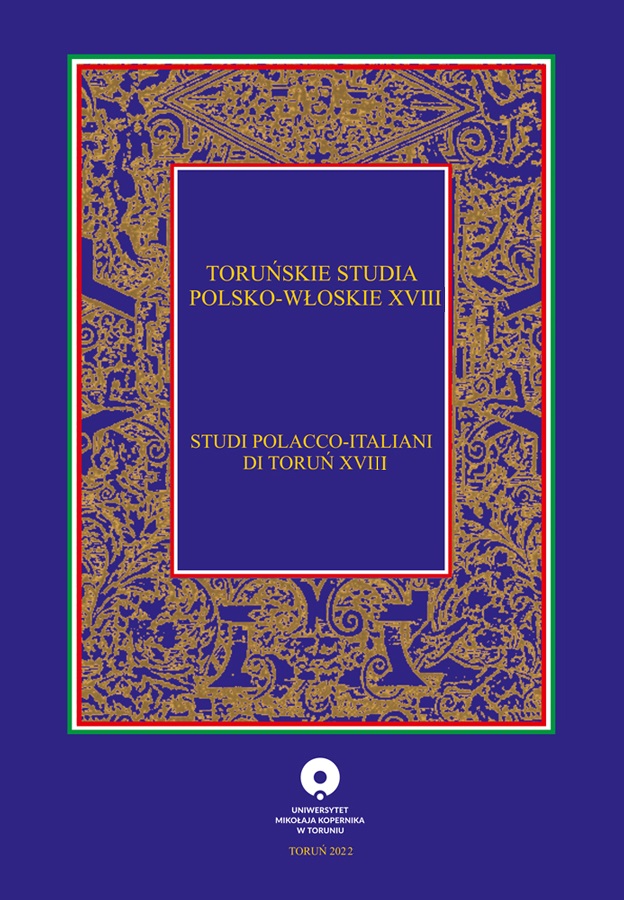ALESSANDRO MANZONI A SPRAWA WŁOSKA: POGLĄDY NA KWESTIĘ JĘZYKA NARODOWEGO WŁOCHÓW W WYBRANYCH PISMACH FILOZOFICZNO-JĘZYKOWYCH NA PRZYKŁADZIE TRAKTATU DELL'UNITÀ DELLA LINGUA E DEI MEZZI DI DIFFONDERLA (1868) I JEGO PRZEKŁADU NA JĘZYK POLSKI
Parole chiave
Alessandro Manzoni, filozofia języka, język narodowy, kwestia języka, wernakularny język florenckiAbstract
The purpose of this article is to outline the views of Alessandro Manzoni on the issue of the national language of Italians throughout the selected philosophical and linguistic works. In the first part of the article, the authors highlighted the figure of the Milanese bard as well as the main theoretical framework for the origins of human speech in general and the sources of inspiration of these concepts mostly deriving from the works of the French Enlightenment philosophers (J. J. Rousseau, É. de Condillac, C. De Brosses) and of their Italian advocates and antagonists (M. Cesarotti, A. Cesari, V. Monti). Subsequently, a general overview of references dedicated to the subject of linguistics shall be presented including published and unpublished pieces. In the final part, the authors synthesized several chief theses exposed by Manzoni in the treaty titled Dell'unità della lingua e dei mezzi di diffonderla [On the unity of the language and the means of diffusing it] being at the same time a report on the proceedings of the parliamentary committee on the national language of 1868, whose authorial translation into Polish language is provided as an integral part of this article.
Riferimenti bibliografici
GROCHOWSKA A., Wewnętrzne zróżnicowanie językowe we Włoszech. Dialekty a język narodowy, „Kwartalnik Językoznawczy”, 3, 2011, 34–46.
LAVEN D., Italy, w: Whar is a Nation? Europe 1789 – 1914, (eds. Timothy Baycroft, Mark Hewitson), Oxford University Press, Oxford 2006, 262–265.
MACCHIA G., Manzoni e la via del romanzo, Adelphi, Milano 2014, 10.
MALINOWSKA M., Język włoski na rozdrożu?, w: Ślady obecności: Księga pamiątkowa ofiarowana Urszuli Dąmbskiej-Prokop przez kolegów, uczniów i przyjaciół (red. I. Piechnik, M. Świątkowska), Wydawnictwo Uniwersytetu Jagiellońskiego, Kraków 2001, 229–233.
MANZONI A., I promessi sposi. Storia milanese del secolo XVII scoperta e rifatta da Alessandro Manzoni. Edizione riveduta dall’autore. Storia della colonna infame. Inedita, Dalla tipografia Guglielmini e Redaelli, Milano 1840, 8.
MANZONI A., Tutte le opere (a c. di A. Chiari, F. Ghisalberti), Mondadori, Milano 1954–1974, 331.
MANZONI A., Frammenti di un libro d’avanzo (a c. di A. Stella, L. Danzi), Università-Dipartimento della scienza della letteratura, Pavia 1983.
MANZONI A., Scritti linguistici (a c. di A. Stella, L. Danzi), Mondadori, Milano 1990.
MANZONI A., Scritti linguistici (a c. di Maurizio Vitale), UTET, Torino 2013.
PANARELLO C., Tra scelte politiche e uso quotidiano: imposizione o accettazione dell’italiano dopo l’unità?, w: Sperimentare ed esprimere l’italianità. Aspetti linguistici e glottodidattici (red. Ilario Cola, Artur Gałkowski, Joanna Ozimska), Wydawnictwo Uniwersytetu Łódzkiego, Łódź 2021, 59–70.
PIETRZAK-THÉBAULT J., Iskry na włosko-dalmatyńskim pograniczu, czyli Tommaseo bez granic, w: Pogranicze, Kresy, Wschód a idee Europy. Seria I (red. A. Janicka, G. Kowalski, Ł. Zabielski), Uniwersytet w Białymstoku, Białystok 2013, 293–306.
ZAMA R., Alessandro Manzoni filosofo del linguaggio. Scritti e studi nel contesto europeo, Carocci editore, Roma 2018, 77–78.
Downloads
Pubblicato
Come citare
Fascicolo
Sezione
Licenza

Questo lavoro è fornito con la licenza Creative Commons Attribuzione - Non opere derivate 4.0 Internazionale.
Stats
Number of views and downloads: 450
Number of citations: 0



